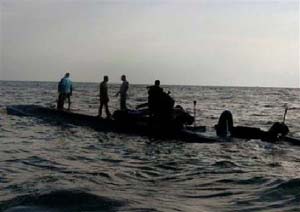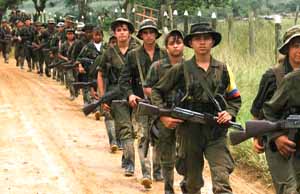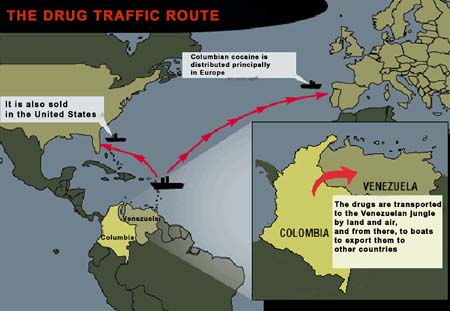 |
International Affairs
Narco-Terror Army Threatens U.S.
Toby Westerman
In the final days of 2007 a "homemade" submarine heading to the United States laden with cocaine for sale on America's streets was intercepted by the U.S. Coast Guard and elements of the Colombian navy. Authorities estimated that from 10 to 12 tons of the narcotic were aboard shortly before the sub's crew attempted to scuttle the vessel.

Drugs traffickers on a homemade sub heading for the US |
This particular smuggling attempt was just one of the hundreds of drug shipments coming from Colombia into the U.S. and Europe. As serious as is the problem of illicit drug smuggling, even more threatening to America is the flow of drug money profits into Colombia, which finances a narco-terror army dedicated to the destruction of the U.S.
The narco-terror army, known as the Revolutionary Armed Forces of Colombia (Spanish acronym: FARC), is able to pursue its illegal activities with relative ease because it receives aid and protection from a Latin American regime hostile to the United States: the oil rich – and now neo-Marxist – nation of Venezuela.
Its president, Hugo Chavez, has formally changed the name of Venezuela, once one of America's most reliable allies in the region, to the Bolivarian Republic of Venezuela. The new name is meant to link Chavez's Marxist ideological aspirations with the memory of the Latin American liberator Simon Bolivar. A shocking exposé published recently by one of Spain's leading newspapers, El Pais, reveals the close connection between FARC and the regime of Venezuelan president Hugo Chavez (
"El narcosantuario de las FARC" 12/16/2007).

Marxist FARC guerrillas terrorize the Colombian countryside |
FARC is a Marxist guerrilla army that has waged a 41-year war against the government of Colombia, costing thousands of deaths and injuries to the people of Colombia. Many thousands have been killed and many more wounded. The war is being waged both in the jungles and in the cities of Colombia. FARC regularly utilizes intimidation and fear to recruit and control. Despite considerable pressure from the Colombian government and aid from the U.S., large areas of Colombia remain under FARC control.
Although Chavez does not appear to be personally involved in the drug trade, the El Pais report indicates that important segments of the regime are receiving millions in profits from dealings with FARC. In Colombia FARC protects drug manufacturers and participates in drug sales.
Information from the U.S. Justice Department states that FARC establishes and enforces drug production pricing in Colombia through torture and murder.
Sixty percent of the cocaine on U.S. streets and half of the world's supply of the drug comes from FARC sources, according to the Justice Department. Some $25 billion alone comes from U.S. drug users in payment for approximately 2,500 tons of Colombian cocaine.
Venezuela protects FARC drug operations
Cooperation with FARC drug operations would earn millions of dollars for their Venezuelan protectors.
Deserters from FARC have informed El Pais that a high level of cooperation exists between the Venezuelan regime and the guerrilla group. One FARC deserter, referred to in the article as "Rafael," said that there is a "non-aggression pact" with the Venezuelan military. Rafael stated that the FARC is able to work easily with the Venezuelan government officials because the guerrillas and regime members have the same "Bolivarian thinking," and because the FARC "pays bribes" (ibid).
"Bolivarian thinking" refers to the Marxist political theory aiming at the unification of Latin America under a single Communist regime.

The Colombian cocaine route: from Colombia to the Venezuelan jungles, to the US and European markets |
Drug shipments enter Venezuela either by road or air. If drug shipments are made by land, Venezuelan border guards are warned in advance, and the transporters encounter no problem. If by air, light aircraft take their illicit cargo from small landing strips in Colombia to larger facilities in Venezuela. From there, tons of cocaine flow to drug users in the U.S. and Europe. The El Pais sources were particularly acquainted with shipments across the Atlantic, either to Europe directly or to Africa and then on to Europe.
The millions of dollars obtained from drug sales are available for the acquisition of sophisticated arms for both FARC and Venezuela. Cooperation also means that FARC representatives are able to travel with Venezuelan identification papers. FARC representatives using Venezuelan passports are known to conduct negotiations with foreign governments in foreign capitals on behalf of the guerrilla group.
Drug money may also give Venezuela additional financial liquidity beyond that furnished by oil revenues to influence the political events in neighboring nations. Venezuelan money is reported to have found its way into the election processes throughout the region, including Mexico, Bolivia, and Argentina.
The alliance of FARC and the Venezuelan regime demonstrates that politics and drug running are compatible.
The possibility exists that the drug gangs which take control of shipments from Colombia or Venezuela could also come to adopt the revolutionary rhetoric arising from FARC and its protectors in Venezuela. Already awash in money and having easy access to weapons of all kinds, a politically oriented drug gang could wreak havoc on U.S. society directly, or support others who are willing to take the chance of striking at the people of the United States.
At present the drug gangs appear to be apolitical, but FARC and the Venezuelan regime warn by example that this may not always be the case.
Illicit drug users are not only destroying themselves and supporting murderous anti-American movements, but they also are supporting drug gangs who may someday turn on the United States itself.

Posted January 9, 2008
Toby Westerman publishes
International News Analysis - Today
An investigative and uncompromising weekly analysis of the world situation
Contact T. Westerman at
www.inatoday.com
or P.O. BOX 5182, Rockford, ILL, 61125-0182
|
International Affairs | Hot Topics | Home | Books | CDs | Search | Contact Us | Donate

© 2002- Tradition in Action, Inc. All Rights
Reserved
|
 |
|